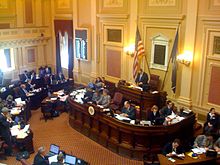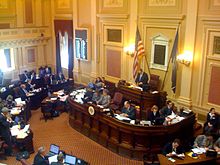Virginia bill repeals HIV criminalization laws due to disparate enforcement and adverse impact

Authored by: Gordon Willis, staff editor
Last month, Senators Mamie Lock and Jennifer McClellan introduced Senate Bill 1138 to repeal the crime of infected sexual battery for people living with human immunodeficiency virus (HIV) and to remove a ban on HIV-positive organ and blood donors.[1] Washington D.C. and 11 other states do not have HIV criminalization laws and Virginia would be the first southern state to strike the laws from its code.[2] Currently, if a person living with HIV does not disclose their status before intercourse, they can be found guilty of a Class 1 misdemeanor or, if they intended to transmit the virus, a Class 6 Felony.[3] Virginia law also states that it is a Class 6 felony to knowingly donate, sell, attempt to donate or sell, or consent to the donation of blood, bodily fluids, organs and tissues by persons living with HIV.[4] HIV criminalization laws are being stricken and modified as they potentially create more harm than they seek to prevent.
Acting Assistant Attorney General Jocelyn Samuels for the Civil Rights Division explained in 2014, “while initially well-intentioned, these laws often run counter to current scientific evidence about routes of HIV transmission and may run counter to our best public health practices for prevention and treatment of HIV”.[5] Proponents of changing Virginia’s law assert that the outdated laws perpetuate negative public perceptions of individuals living with HIV.[6] The CDC reports that the laws increase stigma and discourage testing.[7] Proponents of the move also argue that HIV-criminalization laws create mistrust between vulnerable communities and public health institutions and, “are disproportionately enforced against Black individuals and disenfranchised communities”.[8] Cedric Pulliam, founder of Ending Criminalization of HIV and Over-incarceration in Virginia, pointed to the disconnect between science and the current statutes, “someone can be bit or spit on and they can go to court on that and we know that’s not how transmission occurs”.[9] The HIV criminalization laws are not supported by modern science and are under strict scrutiny for the disparate levels of enforcement.
The Williams Institute conducted a study in Georgia to understand the enforcement of HIV criminalization law.[10] The study found that of those charged with HIV-related offenses, Black men were more likely to be convicted (16%) than White men (9%).[11] There was also disparate enforcement by geography, as individuals living with HIV were arrested at higher rates in rural communities.[12] According to another study carried out by the Williams Institute, in California, 93% of HIV related convictions (specific crimes and sentence enhancements) did not involve specific allegations of conduct that would likely transmit the virus.[13] Proponents for changing the laws see unbalanced enforcement and outdated understandings of the science of transmission as calling into question the need and efficacy of laws that target individuals living with HIV.
Additionally, some experts suggest HIV-criminalization laws might actually increase ‘risky’ behaviors.[14] HIV criminalization laws could create a false sense of security, making individuals more comfortable with decisions that carry higher risk because they feel protected against infection by the existence of the law.[15] Furthering the stigma against individuals living with HIV might discourage individuals from discussing sexual history with their partners.[16] HIV criminalization laws that may promote risky behaviors, do not further the public health goal of reducing HIV transmission.
Laws that are intended to promote public health should be squarely rooted in available science. Proponents of changing the HIV criminalization laws argue that the laws are out of step with the available scientific understanding of HIV transmission and potentially undermine the public health goal they aim to achieve. Other states, such as Washington, have taken steps to modernize HIV criminalization statutes by: repealing some laws altogether; changing the crime of intentional transmission from a felony to a misdemeanor to reduce usage as a sentencing enhancement tool; and leaving laws that apply in situations of transmission to a child or vulnerable adult, as recognition of a distinct public policy goal.[17] Senate Bill 1138 repeals and amends HIV criminalization laws in Virginia in an effort to address the problems with enforcement and impact.[18] The bill was reported from the Judiciary Committee by a 7-5 vote on January 27th.[19]
[1] S. 1138, 2021 Gen. Assemb., Reg. Sess. (Va. 2021).
[2] Juwan J. Holmes, Virginia moves forward on bill to decriminalize HIV transmission, LGBTQ Nation, (Feb. 2, 2021), https://www.lgbtqnation.com/2021/02/virginia-moves-forward-bill-decriminalize-hiv-transmission/.
[3] Va. Code Ann. § 18.2-67.4:1 (2020).
[4] Va. Code Ann. § 32.1-289.2 (2020).
[5] Press Release Justice Department Releases Best Practices Guide to Reform HIV-Specific Criminal Laws to Align with Scientifically-Supported Factors, U.S. Dep’t of Justice (July 15, 2014), https://www.justice.gov/opa/pr/justice-department-releases-best-practices-guide-reform-hiv-specific-criminal-laws-align.
[6] Senate Bill 1138 to Modernize and Repeal Discriminatory HIV Laws in Virginia Receives Senate Judiciary Committee Approval, Blue Va. (Jan. 28, 2021), https://bluevirginia.us/2021/01/bill-to-modernize-and-repeal-discriminatory-hiv-laws-in-virginia-receives-senate-judiciary-committee-approval.
[7] HIV and STD Criminalization Laws, CDC (Dec. 21, 2020) https://www.cdc.gov/hiv/policies/law/states/exposure.html.
[8] Senate Bill 1138 to Modernize and Repeal Discriminatory HIV Laws in Virginia Receives Senate Judiciary Committee Approval, Blue Va. (Jan. 28, 2021), https://bluevirginia.us/2021/01/bill-to-modernize-and-repeal-discriminatory-hiv-laws-in-virginia-receives-senate-judiciary-committee-approval.
[9] Phillip Van Slooten, Equality Virginia outlines 2021 legislative agenda, Wash. Blade (Jan. 11, 2021), https://www.washingtonblade.com/2021/01/11/equality-virginia-outlines-2021-legislative-agenda/
[10] Amira Hasenbush, Williams Inst., HIV Criminalization in Georgia 2 (2018),
https://www.hivlawandpolicy.org/sites/default/files/HIV%20Criminalization%20in%20Georgia-%20Penal%20Implications%20for%20People%20Living%20with%20HIV.pdf
[11] Amira Hasenbush, Williams Inst., HIV Criminalization in Georgia 4 (2018),
https://www.hivlawandpolicy.org/sites/default/files/HIV%20Criminalization%20in%20Georgia-%20Penal%20Implications%20for%20People%20Living%20with%20HIV.pdf.
[12] Amira Hasenbush, Williams Inst., HIV Criminalization in Georgia 10-12 (2018),
https://www.hivlawandpolicy.org/sites/default/files/HIV%20Criminalization%20in%20Georgia-%20Penal%20Implications%20for%20People%20Living%20with%20HIV.pdf.
[13] Amira Hasenbush & Brian Zanoni, Williams Inst., HIV Criminalization in California: Evaluation of Transmission Risk 1 (2016), https://williamsinstitute.law.ucla.edu/wp-content/uploads/HIV-Criminalization-Transmission-Dec-2016.pdf.
[14] Stephanie Pappas, HIV laws that appear to do more harm than good, American Psychol. Assoc. (October 2018), https://www.apa.org/monitor/2018/10/ce-corner.
[15] Stephanie Pappas, HIV laws that appear to do more harm than good, American Psychol. Assoc. (October 2018), https://www.apa.org/monitor/2018/10/ce-corner.
[16] Stephanie Pappas, HIV laws that appear to do more harm than good, American Psychol. Assoc. (October 2018), https://www.apa.org/monitor/2018/10/ce-corner.
[17] Washington, Cent. for HIV Law and Pol’y, https://www.hivlawandpolicy.org/sites/default/files/HIV%20Criminal%20Law%20Reform%20Before%20and%20After%20Washington%2C%20CHLP%202020.pdf (last visited Feb. 4, 2021 at 1:40pm).
[18] S. 1138, 2021 Gen. Assemb., Reg. Sess. (Va. 2021).
[19] SB 1138 Sexually transmitted infections; infected sexual battery; repeal, Va. Legis. Info. Sys. (last visited Feb. 4, 2021 1:21pm) https://lis.virginia.gov/cgi-bin/legp604.exe?211+vot+S03V0075+SB1138.

